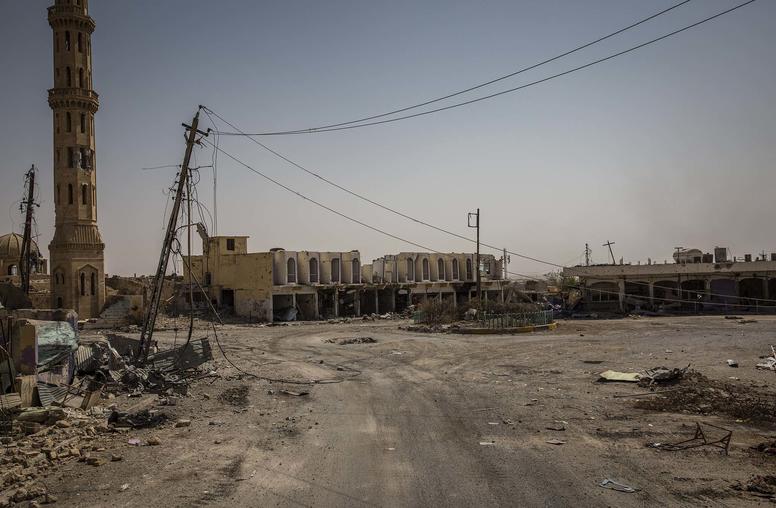Research & Analysis
U.S. Institute of Peace’s articles, reports, tools and other features provide policy analysis, research findings, and practitioner guides. These publications examine critical conflict issues at the center of the Institute’s work to prevent and resolve violent conflict.
The views expressed in these publications are those of the author(s).

A New Test for Iraq’s Democracy and Stability
The sudden crisis around Russia threatens democratic norms and energy markets worldwide, only heightening the urgency of stabilizing Iraq, the world’s fifth-largest oil producer. Yet five months after Iraq’s elections, held in response to massive protests against ineffective governance, political factions remain dangerously deadlocked in efforts to form a new government. Shaping a more stable, peaceful Iraq—and responding to the 2019-2020 grassroots demands for democratic, accountable governance—will require a fuller inclusion of Iraq’s ethnic and religious minorities. Yet the prospects remain unclear. Iraq’s minority communities are watching carefully, as their future depends on it.

Iraq’s Election Raises More Questions Than Answers
Muqtada al-Sadr, a Shia cleric whose Mahdi Army followers battled U.S. forces during the years of the occupation, made big gains in Iraq’s parliamentary election on October 10. His victory could pose problems for the United States and Iran. But despite the Sadrist List’s electoral success, it is not a given that al-Sadr will be the next man to lead Iraq, or even be the only kingmaker. USIP’s Elie Abouaoun examines the outcome of the election, the electoral process and the implications for Iraq’s future.

Can Iraq’s Parliamentary Elections Bring Change?
On October 10, Iraq will hold national parliamentary elections, the fifth national elections since Iraq adopted its 2005 constitution. And despite waning expectations about what these elections might accomplish, they remain an important avenue for pursuing change through peaceful means.

Sarhang Hamasaeed on Iraq’s Elections
“All the energy of the country is focused on October 10” as Iraq prepares for crucial parliamentary elections, says USIP’s Sarhang Hamasaeed. “We’ll see if it will produce a government and a parliament that [is] closer to what the people expect … and restore some of the faith of the voters in the process.”

Four Years After ISIS, Iraq’s Tal Afar Remains Riven by Communal Divisions
Iraq is a country beset by a host of political, security, economic and social challenges, including addressing the human legacy of the Islamic State’s (ISIS) rampage through the country just a few years ago. Almost four years after the liberation of Nineveh’s Tal Afar district from ISIS control, feelings of marginalization, neglect and exclusion persist among communities in the region, epitomizing how such feelings have driven ethnic and sectarian tensions and conflict in post-2003 Iraq. Recognition of these sentiments and an understanding of the factors underpinning them, can help communities in the district allay these drivers of tension and move forward together.

Beyond Security: The Quest for a Sustained, Strategic U.S.-Iraq Partnership
On Monday, President Joe Biden received Iraqi Prime Minister Mustafa al-Kadhimi at the Oval Office to strengthen bilateral relations and discuss matters of mutual interest, key among them being the future of U.S. troops in Iraq. Despite widespread thinking that Iraq and the Middle East do not rank high in the mix of the Biden administration’s priorities, there have been clear signals that Iraq remains important enough to the United States and that Kadhimi and his government are partners that the United States can work with and should support. While most of the media attention focused on the announcement of the change in U.S. force posture in Iraq, the key takeaway from this week’s meeting is that the United States and Iraq seek to maintain their strategic partnership — and build on it.

ISIS-Driven Displacement Remains Key Challenge as Iraq Prepares for Elections
Iraq remains a struggling nation confronting enormous, social, economic and reconstruction challenges yet progressing in critical areas such as resettling its displaced population and preparing for national elections this fall, two ministers of the Baghdad government said.

Unemployment Replaces ISIS as Top Security Concern for Minorities in Iraq
In the summer of 2014, the Islamic State group (ISIS) seized control of much of Iraq’s Nineveh province, including the provincial capital of Mosul. The militant group committed genocide against ethnic and religious minorities. Today, more than three years since the military defeat of ISIS in Iraq, ethnic and religious minority residents of three key districts of Nineveh say rampant unemployment, not ISIS, is their top security concern, according to data gathered by the United States Institute of Peace.

Sarhang Hamasaeed on Iraq’s Progress and Problems
With pivotal elections scheduled for October, USIP’s Sarhang Hamasaeed says Iraqis “want democracy, they’re fighting for it with their lives.” Meanwhile, Iraq is still grappling with simmering discontent among many citizens and the destabilizing role of foreign powers.

Where Is Iraq a Year After Prime Minister Kadhimi Took Office?
Iraqi Prime Minister Mustafa al-Kadhimi came to power a year ago today after a protest movement toppled the previous government and successive attempts to establish a new one failed. Inheriting a country deep in the midst of political and economic crises, Kadhimi has spent the last year trying to put Iraq back on the path toward stability all while navigating U.S.-Iran tensions playing out on Iraqi soil. USIP’s Elie Abouaoun and Sarhang Hamasaeed look at what Kadhimi has done to attempt to placate protesters, the importance of Iraq’s October national elections and how the prime minister has dealt with U.S.-Iran tensions.